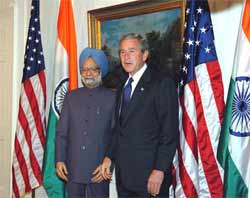|
Mumbai: US president George Bush's telephone talk with prime minister Manmohan Singh may have helped salvage the drifting Doha Round of world trade negotiations at Geneva, newspaper reports said. President Bush made a private telephone call to Manmohan Singh, which may go down in history as the telephone call that helped salvage George W Bush's legacy as President of the United States, the Sunday Telegraph said in a report.  The two leaders ''discussed the importance of all leading WTO members making contributions to a breakthrough on the Doha Round of negotiations,'' US national security council spokesman Gordon Johndroe said in a statement. The two leaders ''discussed the importance of all leading WTO members making contributions to a breakthrough on the Doha Round of negotiations,'' US national security council spokesman Gordon Johndroe said in a statement.
The original topic of discussion was supposed to be the Indo-US nuclear deal, but was replaced by another item and instead of one telephone call, Bush made three, the report said. As in the case of the Indo-US civil nuclear agreement, the Bush government is also looking forward to concluding the Doha Round of world trade talks before President bush demits office on 20 January 2009. (See: IAEA - India begin 'additional protocol' talks in Vienna today) The WTO ministerial talks at Geneva, which aim at removing tariffs in both rich and poor countries, has been on the brink of collapse before it was extended till middle of this week. In fact, most of the ministers attending the talks were also ready to pack off declaring failure, the report noted. A break-down of the talks would have made the prospect of reviving world trade talks difficult. On the other hand, it would have led to increased protectionism and increased geopolitical insecurity. Failure would rule out the prospect of reigniting the talks for years; it would pave the way for greater protectionism and potentially greater global geopolitical insecurity as countries threaten to use tariffs as an economic weapon against each other. Commerce minister Kamal Nath and his Brazilian counterpart Celso Amorim were firm in their stand against easing industrial tariff for the developed countries in the face of stiff resistance from the industrialised countries on removing agricultural trade barriers in those countries. Kamal Nath defended his position against the rich countries' move to deny poor countries the right to safeguard the livelihoods of their farmers while they themselves enjoyed similar protection for themselves. ''If it means no deal, so be it," he said. But, within in a few hours after Bush's first phone call late on Thursday, something changed and India and Brazil started to negotiate, the newspaper said. India is now looking up to over 100 developing countries for support to ensure that farmers remain protected after a global trade deal is signed for liberalising the farm and other sectors.
(Also see: Developing countries split over new WTO negotiating draft)
|